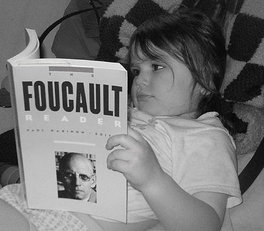|
Do you struggle to get your students to read? If so, a 2010 study looking at time-use data suggests you are not alone. Economists Philip Babcock and Mindy Marks found that in 1961, full-time students allocated 40 hrs/week toward class and studying, but by 2003, that time had fallen to about 27 hrs/week. So, what to do about it?  In a 2004 article in Teaching Sociology, author Jay Howard described a method that he found to be effective at getting his students to complete their assigned readings. This method, a form of “just-in-time teaching,” had students read what he believed to be engaging readings and taking online quizzes on the reading before each class. Howard created a multiple choice and short answer question for each reading. For the multiple choice, Howard (2004: 386) stated that “accepting Berger’s (1963) claim that the first wisdom of sociology is that things are not always what they seem, I tried to write multiple choice questions that would force students to consider some of the evidence in each selection that challenges conventional wisdom.” Short answer questions required students to summarize or synthesize information that had read. I was intrigued by this technique, so I started experimenting with a version of this method for my Social Problems class this semester (60 students, mostly Freshmen and Sophomore non-majors) by using the University of Maryland’s Blackboard system to integrate multiple choice questions into my gradebook. Before each class, I post a few multiple choice questions based on the reading and students must answer them at least 2 hours prior to the start of class (this gives me ample time to review the results and adjust my class accordingly). Students can use their books and readings, but I ask questions that are non-intuitive so they are not likely to get it correct just by guessing. Their responses are automatically graded by the Blackboard software and entered into my gradebook; when the quiz deadline ends, the reading quiz questions are automatically posted and students can see what they got right and wrong. The students are able to see their own scores, and I can evaluate if there are particular points that students are missing. While Howard used a mix multiple choice and short answer questions, I chose to use only multiple choice questions given the size of my class and various other time constraints (like finishing my dissertation!).  In two semesters of JiT quizzes, Howard reported a 30% increase in reading, with 98% of his students “usually” or “always” reading assignments. While I have only tried this for less than a month, I have seen a significant jump in students in my class who have reported reading “most” or “all” of the class readings: during an informal mid-semester evaluation, 83% of my students reported reading “most” or “all” of the class readings. This is a significant increase from previous semesters where 50-67% (it pains me to say that publicly!) of my students reported reading “all” or “most” of the class readings—that number seemed to vary depending on my readings, use of pop quizzes, class size, and composition of the class (such as mostly majors vs. non-majors, lower level vs. upper level students, etc). While I was happy to see many more students complete their reading, I am still left wondering why it was not higher. In this preliminary experiment, this lower number may be because I did not conduct the reading quizzes during the first couple weeks of readings, or perhaps because the questions were all multiple choice questions so students thought they could guess at a sufficient number of correct answers (I believe they are now learning that they cannot do that, however). Nonetheless, this preliminary (and very un-scientific) data has convinced me that it works and will be part of a multi-pronged effort to get my students to read. Furthermore, on their anonymous evaluations, several students actually reported liking that I conducted the reading quizzes. Paul Dean
1 Comment
PEDRO SANTACRUZ
2/26/2024 02:03:57 pm
Investment is one of the best ways to achieve financial freedom. For a beginner there are so many challenges you face. It's hard to know how to get started. Trading on the Cryptocurrency market has really been a life changer for me. I almost gave up on crypto at some point not until saw a recommendation on Elon musk successfully success story and I got a proficient trader/broker Mr Bernie Doran , he gave me all the information required to succeed in trading. I made more profit than I could ever imagine. I'm not here to converse much but to share my testimony; I have made total returns of $10,500.00 from an investment of just $1000.00 within 1 week. Thanks to Mr Bernie I'm really grateful,I have been able to make a great returns trading with his signals and strategies .I urge anyone interested in INVESTMENT to take bold step in investing in the Cryptocurrency Market, he can also help you RECOVER your lost/stolen Cryptocurrencies. you can reach him on WhatsApp : +1(424) 285-0682 or his Gmail : [email protected] bitcoin is taking over the world, tell him I referred you
Reply
Leave a Reply. |
.
.
Tags
All
|
 RSS Feed
RSS Feed